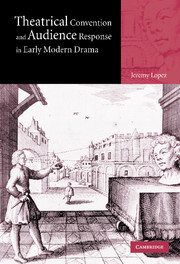Book contents
- Frontmatter
- Contents
- Acknowledgments
- Introduction
- PART I
- 1 “As it was acted to great applause”: Elizabethan and Jacobean audiences and the physicality of response
- 2 Meat, magic, and metamorphosis: on puns and wordplay
- 3 Managing the aside
- 4 Exposition, redundancy, action
- 5 Disorder and convention
- PART II
- Plays and editions cited
- Works cited
- Index
4 - Exposition, redundancy, action
Published online by Cambridge University Press: 22 September 2009
- Frontmatter
- Contents
- Acknowledgments
- Introduction
- PART I
- 1 “As it was acted to great applause”: Elizabethan and Jacobean audiences and the physicality of response
- 2 Meat, magic, and metamorphosis: on puns and wordplay
- 3 Managing the aside
- 4 Exposition, redundancy, action
- 5 Disorder and convention
- PART II
- Plays and editions cited
- Works cited
- Index
Summary
With asides, paying attention to all the right things frequently means simply getting all the jokes. In serious plays or situations it means seeing through pretense or seeing what should be but, tragically, is not obvious to other characters. In both serious and comic situations, the tone of asides as well as their formal structure – direct engagement with the audience – generally suggest that we are not being told anything we do not already know. The stakes are somewhat different with the convention of expository speeches or dialogue: here, the information we must pay attention to is implicitly essential, and not something we are expected to know until the moment we hear it. Once we hear it, it is assumed we will remember it. Whereas puns and asides work to create the theatrical space required for the non-naturalistic stage, exposition fills the spaces where that stage cannot, or seems that it cannot, represent action.
Muriel Bradbrook argues that exposition of plot, like the convention of characters describing their feelings “with scientific detachment,” is due to the “Elizabethan habit of making everything explicit and of stating everything in the verse itself” (p. 127). These conventions “show that the awareness of the audience was acknowledged, and that there was no question of the characters stepping ‘out of the picture,’ for they were never in it” (p. 116).
- Type
- Chapter
- Information
- Publisher: Cambridge University PressPrint publication year: 2002



